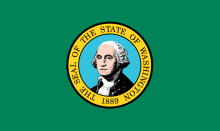Washington Law Could Unleash the Power of Utility Districts to Offer Retail Broadband Services
In our year-end roundup and prediction show on the Community Broadband Bits podcast last month, the more optimistic members of the team predicted that 2021 would see some states remove barriers to municipal broadband.
It looks like in a few places momentum might be headed in that direction. Last week we wrote about a bill in Arkansas that would remove almost all barriers in the state, allowing political subdivisions and consolidated utility districts to pursue projects on their own and without external grants.
New legislation in Washington looks similarly promising. On Thursday, January 21st, House Bill 1336 was introduced [pdf], removing specific barriers which currently prevent Public Utility Districts (PUDs) from delivering broadband service on a retail basis. Currently, PUDs are only able to offer unrestricted broadband on a wholesale basis through a dark fiber or open access network. Under certain conditions PUDs can offer retail service, but only if an existing Internet Service Provider (ISP) leasing that PUD infrastructure ceases operations, and even then, they are only allowed to do so as long as no other private ISP steps up to offer retail service. In the interim, PUDs can provide service for a maximum of five months and must, within thirty days, begin the process of finding a replacement.
The new law removes that barrier, and not only allows PUDs to construct and operate retail broadband networks inside their existing territory, but outside as well. In addition, it establishes that PUDs can work with federally recognized tribes to construct infrastructure.
Bipartisan Approach
The co-sponsors of the bill have staked out different rationales for removing the restrictions, with Drew Hansen calling for broadband to operate as a public utility and Alex Ybarra more concerned with the unconnected pockets of Washingtonians left by the private ISPs. Bill co-sponsor Alex Ybarra told the Washington State Wire:



